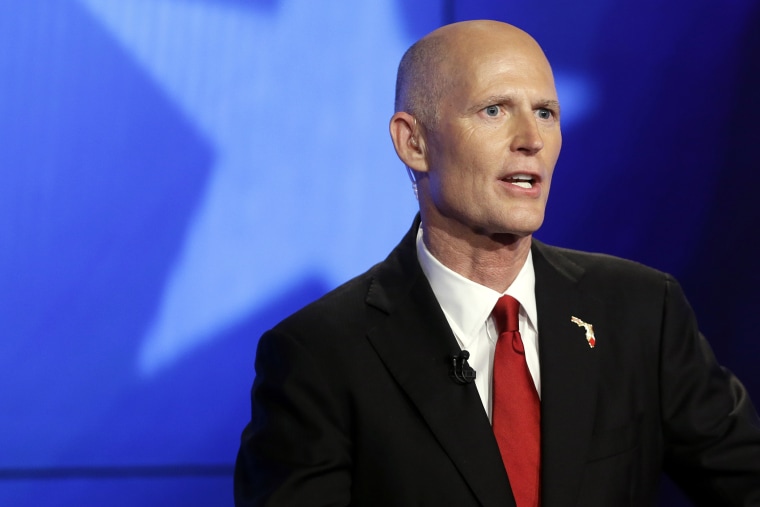There's a very real possibility that Republican justices on the Supreme Court will gut the Affordable Care Act later this year. Every state without their own exchange marketplace -- in other words, every state where consumers have enrolled through healthcare.gov -- would suddenly have millions of families unable to afford their own insurance because of the Supreme Court.
There's no shortage of questions as to what would happen at that point, but chief among them is what states would do to help their own residents.
Ohio Gov. John Kasich (R), for example, said last week that if the Supreme Court took benefits away from 500,000 of his constituents, "we'd have to look at" setting up a state marketplace to prevent hardship.
But note how other Republican governors are weighing their options.
Florida Gov. Rick Scott, a conservative Republican, said the potential of an abrupt stop to the subsidies is Washington's doing. It's not his job to find a solution. "This is a federal program, it's a federal problem," he said at the American Action Forum on Friday.
In a practical sense, the far-right governor -- who used to run a health care company -- is mistaken. Florida, if it wanted to, could have an exchange in which private insurers compete for Floridians' business. That's not up to Washington; it's up to Tallahassee.
What's more, let's also not forget that when it came to enrollments through "Obamacare" this year, Florida ranked #1 in the nation with a whopping 1.6 million enrollees, of which 90% received subsidized coverage through the ACA.
Rick Scott, confronted with the possibility of suffering constituents and a massive loss in revenue has a plan: do nothing. The governor fully intends to just sit back and watch while hundreds of thousands of Florida families lose access to basic medical care.
Clearly, this is not to suggest it'd be easy for states to deal with systemic chaos imposed by the Supreme Court for no reason. It wouldn't. Many states are struggling with the possibility of a court-created crisis, and those hoping for a Republican-led Congress to approve a simple fix will be disappointed -- federal GOP lawmakers have already said that if Republicans on the high court start the fire, Republicans in Congress will simply let the American health care system burn.
But there's still something jarring about the Florida governor's indifference. There's a reason "It's not my problem" is one of those attitudes we rarely hear from those who claim to be leaders.
In related ACA news:
* The plaintiffs in the King v. Burwell case really do have a standing problem.
* Several prominent GOP lawmakers in Congress were absolutely certain that healthcare.gov customers were eligible for subsidies, until they had a political reason to ignore reality, at which point the same exact people were absolutely certain that healthcare.gov customers were ineligible for subsidies. Now they're trying to explain their ridiculous cognitive dissonance. It's not going well.
* The White House's Phil Schiliro had a good piece yesterday on why the one-sentence phrase at the heart of the King case is actually pretty easy to explain.
* Brian Beutler took a closer look at the right's court filings in the King case and found that the litigation "leans for support not on a clear historical record, or broad expert consensus, but on the kinds of cliched signifiers you might expect to hear on a Fox News Obamacare panel."
